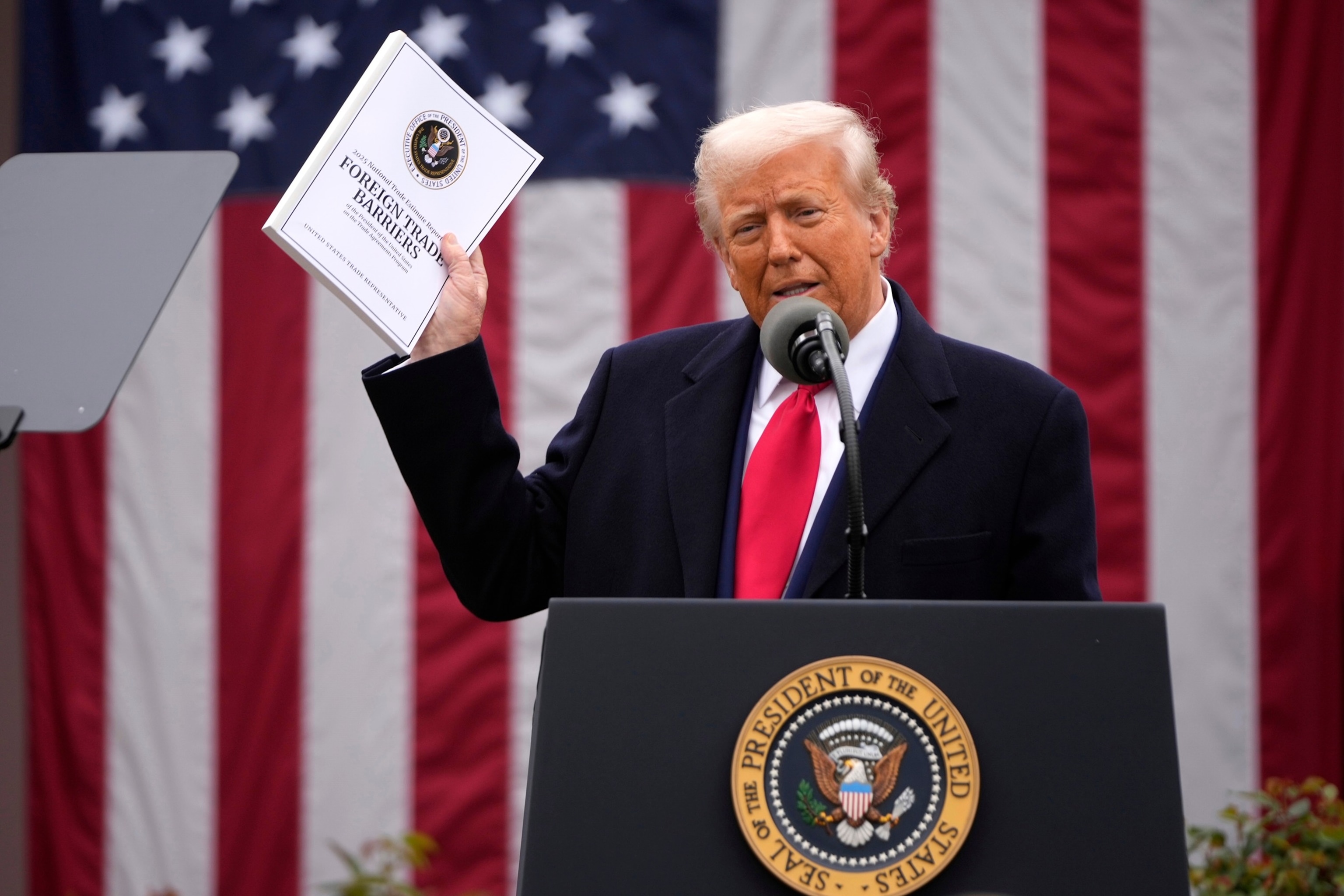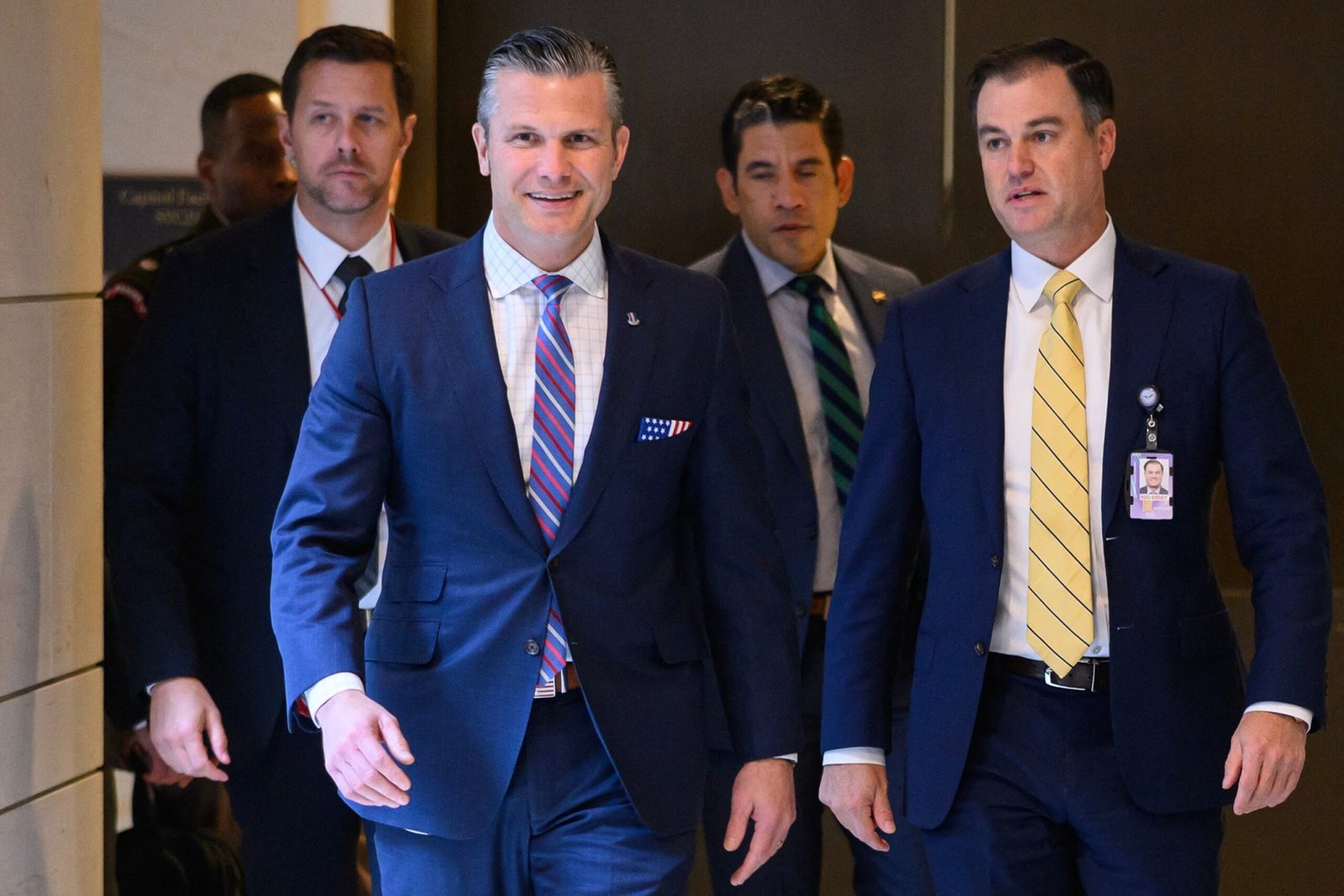Wendy Bruch, owner of Dry Ridge Farm in Marshall, North Carolina, said the announcement of rates by President Donald Trump is like “pouring salt into a wound that is now beginning to heal.”
During a meeting of small businesses on Wednesday, he said that tariffs will increase the costs of “everything, from fertilizers and food to construction materials and tractors”, hitting the agricultural community while still recovering from crop losses after Hurricane Helene.
“Personally, we face the uncertainty of how retaliation rates will affect our greatest expense, our animal food,” Bruch told Wlos from the ABC News Asheville subsidiary.

President Donald Trump speaks during an event to announce new rates in the Rosas Garden in the White House, on April 2, 2025, in Washington, DC
Mark Schiefelbein/AP
Bruch and other small businesses are weighing the tariffs Trump presented against practically all the United States shopping partners on Wednesday afternoon. He described the tariffs as “friendly reciprocal” and will focus on the nations that affirmed that they were the worst criminals in commercial relations with the United States.
The new measures, which Trump described as “historical”, include a minimum reference rate of 10% in all commercial partners and, in addition, more specific punitive levies in certain countries, including China, the European Union and Taiwan.
“We will charge you approximately half of what they are and we have been charging,” he said, and added, “because we are being very friendly.”
Hendrick Svendsen, owner of a furniture store in Merriam, Kansas, told ABC News on Wednesday that he decided to close his store due to Trump’s rates announcement.
“We just made the decision that we are going to close, we will leave in August,” Svendsen said.
He said there is no way to continue the store operation through the use of American manufacturing products, with 90% of his articles made abroad.
“I do not think that the manufacture of furniture returns to the US. North Carolina, where it used to be done, is like a ghost city,” said Svendsen in ABC News Live. “When it comes to skills and workers, I don’t think we have that in the United States”
Furniture manufacturing works in the United States have decreased in recent months, with 336,900 reported in February, according to the US Labor Statistics Office.

The Secretary of Commerce, Howard Lutnick, has a table while President Donald Trump speaks during an event to announce new rates in the Rosas Garden in the White House, on April 2, 2025, in Washingto, DC
Mark Schiefelbein/AP
Simon Bryant, owner of a restaurant in San Francisco, said ABC station Kgo These food costs have already been difficult to handle due to avian flu, and tariffs could make things even more challenging.
“The reality is that everyone pays higher prices,” Bryant said. “We have to discover what to do as a community.”
But, there are people who are optimistic about tariffs, including Duane Paddock, the owner of a Chevrolet dealer in Buffalo, New York. He told ABC News Live that he has seen the best sales in 13 years.
While he is not sure of the exact impact of tariffs, he said he hopes that Trump’s announcement is “better for our country” and that his concessionaire will continue “maintaining the prices as low as possible and make our fair part to help customers.”
“Whether President Trump was a democrat or republican, I have to have faith in my president and that is what I choose to do,” said Paddock.
It also emphasized the importance of these rates that allow products to be made in the United States.
“It is a great opportunity for people to return with manufacturing and have the opportunity to have a great middle class life and increase their compensation over time,” said Paddock.
James Evans, a manufacturer who produces car parts in the United States, told Baltimore ABC Affiliate Wmar The rates will be “great for us in six months to a year probably.”
“I think in three, four years, we should prepare and other people who are manufacturing here in the United States for success,” Evans said. “I am fine when dealing with some headaches for the next six months to a year and I hope things continue as I think and then we will be good, but maybe not. Only time will say it.”
In South Carolina, shrimp receptors are also satisfied with Trump’s announcement. Rocky Magwood told Charleston ABC Wciv’s affiliate that he can now “sell everything”. According to him South shrimp alliance94% of shrimp consumed in the United States are imported, with India and Ecuador that supply almost 70%.
“This is the best thing we see,” Magwood said. “Maybe people want to buy our shrimp more. I can’t say about politics in one way or another because I don’t like politics. That is not what feeds my family.”
But Leah Ashburn, president and executive director of Highland Brewing in North Carolina, said that moving to US production is not feasible in all industries, especially in her company, which depends on aluminum to make beer cans. Although there are existing aluminum manufacturers in the United States, Canada remains the fourth largest primary aluminum supplier, behind China, India and Russia, according to the Canadian government.
In 2021, the United States represented less than 2% of world aluminum production, according to a Congress Research Service Report.
“The United States simply cannot pivot to make aluminum cans,” Ashburn told Wlos. “Mining is not done here. Aluminum is brought from 95% of other countries, and we depend on Canada. The effort to make aluminum here would be complex, expensive and would take a long time. It will not come soon.”
He also said that his business cannot raise their prices because consumers have “reached their limit in what they are going to pay for a package of six.”
The 10% basal rate rate enters into force on April 5, according to the High officials of the White House. The “friendly reciprocal” rates enter into force on April 9 at 12:01 am, authorities said, and will affect approximately 60 countries.
Jaclyn Lee De ABC News.






